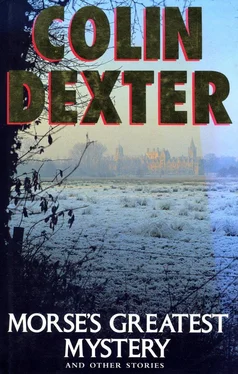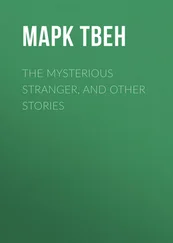“Clue Number Three. Dear old Toot-and-come-in — another postcard, another message, pretty certainly in the same handwriting: ‘Cairo’s bloody hot but wish you were here.’ Remember? Signed ‘B.’
“Clue Number Four.” Morse picked up the couplet from “Last Poems.” “Lines from a love poem, Lewis — with the seas between the pair of them — written from Los Angeles — the place to which the letter was re-addressed by Mrs. S-G in the story. Remember? And we know why he went to all these places, don’t we?”
Lewis didn’t. But he nodded.
Why not?
“Then there was Clue Number Five — that walloping great clue you found straightaway: the fact that Sheila Poster had worked in the Geology Department here. Huh! I was blind.
“Then there was Clue Number Six... from The Times crossword yesterday... Well, no, perhaps that was just a coincidence.
“And to cap it all you tell me about those almighty cracks in your bedroom wall...”
“Crack — only one crack, sir — in the kitchen , actually.”
Morse waved his right hand as if dismissing such trivial inaccuracies as of minor moment.
“And , Lewis, the dates all match — all of ’em. In each case they fall about ten days or a fortnight after the events — I’ve checked ’em with a lovely girl called Eunice Gill in the OUP cartographical section.”
(What hadn’t Morse done, Lewis was beginning to wonder.)
“And she faxed me this,” continued Morse.
Lewis took the sheet and read a newspaper paragraph, dated 28.xi.92:
EARTHQUAKE SUMMIT
Following the major earth tremors which recently shook central Los Angeles, seismologists from all over the world, including the UK, will be assembling in Sacramento early in the new year to discuss improvements in the forecasting of potential disasters. No conference of similar scale has previously been held, and its anticipated 6-week duration reflects the urgency which is attached to this cosmic problem.
It had all taken Lewis far too long, of course; but now he let the information sink in. And finally he spoke:
“So what we need is a list of the delegates at the conference. Shouldn’t take—”
But he got no further, for Morse handed him a sheet on which the members of the UK delegation were listed.
“Good man — Sergeant Dixon — you know,” said Morse.
Lewis ignored the tribute. “None of ’em with the initial ‘B,’ though.”
“Why not try ‘R’?” asked Morse quietly.
So an embarrassed Lewis tried “R,” and looked again at the middle name of the five: Robert Grainger, D.Phil., MA.
“So all we need is to find out his address—”
“Cumnor Hill, Lewis. Not far off, is it? Palmer traced him. Good man — Palmer — you know.”
White on a throne or guarded in a cave
There lives a prophet who can understand
Why men were born...
(James Elroy Flecker, The Golden Journey to Samarkand )
“Why do you think he did it?” asked Lewis as they drove along the Botley Road.
“Grainger’s possible motives, you mean? Well, he was hot favourite for the chair in Geology — you’ve just discovered that for yourself. Great honour, you know, having a professorial chair at Oxford. Biggest prize of the lot. For some people.”
Lewis nodded, for he half understood now, and himself took up the thread: “And Sheila Poster was going to ruin it all. Just as he’s going to claim his birthright, he’s suddenly faced with the prospect of scandal and failure and divorce... and the nightmare of some squawking infant into the bargain.”
Morse was unusually slow in his reply as they started to climb Cumnor Hill. “I wouldn’t know about those last two things, Lewis.”
They walked along the flagged path that bisected the well-tended lawn, weedless even in winter, and knocked on a front door which was immediately opened by a prematurely grey-haired man, slimly built, in his late forties or so, his eyes looking at them over half-lensed spectacles.
“You’re the police, I suppose?”
Morse showed his warranty. “Dr. Grainger?”
For a few seconds the man hesitated. Then stood back and ushered his visitors into a well-appointed lounge, three of its walls completely lined with books.
“Yes. I suppose we’d better get it over with.”
He spoke quite slowly, and without emotion — at least to begin with. Yes, he knew that Sheila Poster had been murdered. He’d read it in the Oxford Mail . Yes, he’d had an affair with her; she’d been putting pressure on him to leave his wife and go to live with her; she’d told him she was pregnant — though he’d doubted the claim. His wife now knew most of the truth, but had only become directly involved because Sheila had contrived somehow to get a job as a cleaning-woman in the house there, and then had sought to poison the marital relationship — what little there was left of it...
It was at this point that the belittled Lewis (seemingly to Morse’s mild amusement?) decided to assert himself.
“It’ll be up to Mrs . Grainger to give us details about her side of things, sir. You yourself weren’t here, were you, when Miss Poster was working for your wife?”
Grainger, who hitherto had been speaking directly to Morse, now turned his eyes upon Lewis.
“You mean you’re not prepared to take my word about what my wife has told me?”
“We’re not here to answer questions, Dr. Grainger — we’re here to ask them,” snapped Lewis.
Irritatedly, Grainger turned back to Morse. “Is it necessary for us to have this man with us, Inspector? I am not used to being spoken to in this way and I find it wholly and unnecessarily offensive!”
“This is a murder enquiry, sir,” began Morse rather lamely. “You must understand—”
“But I do understand. And I’m telling you you’re wasting your time if you think you’ll find any murderer in this house.”
“Where were you on Sunday night?” asked Morse quietly.
“Huh! I’ll tell you. I was in America — that’s where I was.”
“And you can prove that?”
Grainger stood up, and followed by Lewis walked over to a bureau on which, beside a framed wedding-photograph, lay an envelope (as it proved) of travel documents. He handed it to Morse.
“As you’ll see, I arrived back only yesterday afternoon — Monday. The plane, believe it or not, landed punctually at 4:15 P.M. I caught the Heathrow bus just after five o’clock, and I got to Oxford about quarter to seven.”
“It’ll certainly be pretty easy to check up, then,” said Lewis, smiling serenely; and it was Morse who now looked round at his sergeant, more in admiration than in anger. Yet he himself sat silent and listened only, as Grainger snarled at Lewis once more, the antagonism between the two men now almost physically tangible.
“Oh yes. It’ll hardly require a man of your calibre to check up on that . And it’ll be pretty easy to check up on my wife as well. But let me tell you something. Sergeant! It won’t be you who sees her. Is that clear? She’s extremely upset — and you can understand why, can’t you? Sheila was here working for her until a fortnight or so ago. All right? Now you might get a bit blasé about murders, Sergeant — but other people don’t . My wife is under sedation and she’s not going to see anyone — not today she isn’t. And she won’t see you , in any case! Your inspector here sounds a reasonably humane and civilized sort of fellow — and perhaps there are still a few others like him in the Force. So any of them can see my wife. All right? But it won’t be you , Sergeant. Why? Because I say so!”
Читать дальше












